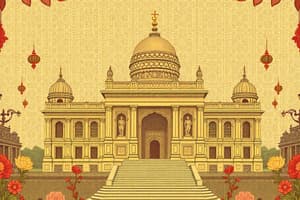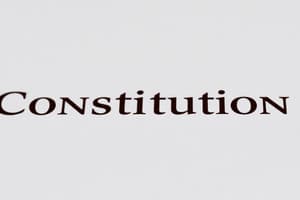Podcast
Questions and Answers
प्रधानमंत्री किनके सहयोगी मंत्रियों का चयन करते हैं?
प्रधानमंत्री किनके सहयोगी मंत्रियों का चयन करते हैं?
राष्ट्रपति की स्वीकृति के साथ
राष्ट्रपति किसे नियुक्त करते हैं जिसे वह सदन के सदस्यों का अधिकांश विश्वास करता है?
राष्ट्रपति किसे नियुक्त करते हैं जिसे वह सदन के सदस्यों का अधिकांश विश्वास करता है?
प्रधानमंत्री
सदन के सदस्यों की कुल संख्या की प्रतिशत संख्या समेत प्रधानमंत्री की संख्या में कोई अधिकतम सीमा क्या है?
सदन के सदस्यों की कुल संख्या की प्रतिशत संख्या समेत प्रधानमंत्री की संख्या में कोई अधिकतम सीमा क्या है?
पंद्रह प्रतिशत
किस तारीख को भारत का संविधान लागू हुआ था?
किस तारीख को भारत का संविधान लागू हुआ था?
किस अनुच्छेद के तहत राष्ट्रपति को प्रधानमंत्री नियुक्त करने का अधिकार है?
किस अनुच्छेद के तहत राष्ट्रपति को प्रधानमंत्री नियुक्त करने का अधिकार है?
किस अनुच्छेद के तहत मंत्रिमंडल से संबंधित विषय है?
किस अनुच्छेद के तहत मंत्रिमंडल से संबंधित विषय है?
भारतीय संविधान के अनुसार, मंत्रिपरिषद की सामूहिक जवाबदेही किसके प्रति है?
भारतीय संविधान के अनुसार, मंत्रिपरिषद की सामूहिक जवाबदेही किसके प्रति है?
राष्ट्रपति द्वारा किए जाने वाले महत्वपूर्ण कार्यों में से एक क्या है?
राष्ट्रपति द्वारा किए जाने वाले महत्वपूर्ण कार्यों में से एक क्या है?
प्रधानमंत्री की भूमिका में निम्नलिखित में से कौन सा कार्य शामिल नहीं है?
प्रधानमंत्री की भूमिका में निम्नलिखित में से कौन सा कार्य शामिल नहीं है?
$\alpha$ को $\beta$ से विभाजित करने पर शेषफल $\gamma$ प्राप्त होता है। यदि $\alpha = 37$, $\beta = 5$ और $\gamma = 2$ है, तो $\alpha$ का मान क्या है?
$\alpha$ को $\beta$ से विभाजित करने पर शेषफल $\gamma$ प्राप्त होता है। यदि $\alpha = 37$, $\beta = 5$ और $\gamma = 2$ है, तो $\alpha$ का मान क्या है?
राष्ट्रपति किस प्रकार संविधान की रक्षा करते हैं?
राष्ट्रपति किस प्रकार संविधान की रक्षा करते हैं?
प्रधानमंत्री के महत्वपूर्ण कार्यों में से एक क्या है?
प्रधानमंत्री के महत्वपूर्ण कार्यों में से एक क्या है?
Flashcards are hidden until you start studying
Study Notes
Indian Polity: Focusing on the Constitution of India and Roles of the President and Prime Minister
The Indian polity is a parliamentary democratic republic, governed by the Constitution of India. This article aims to provide an in-depth examination of the key subtopics within this field, specifically focusing on the Constitution of India and the roles of the President and Prime Minister.
Constitution of India
The Constitution of India is the supreme law of the country that outlines the framework for its governance. It was adopted on 26 November 1949 and came into effect on 26 January 1950. The document consists of several articles, including those related to the Council of Ministers (Article 75) and the appointment of the Prime Minister (Article 75(1)).
Under Article 75, the President shall appoint the Prime Minister who, in his opinion, commands the confidence of the majority of members of the Lok Sabha. The Prime Minister is then responsible for appointing other ministers with the President's approval. The total number of ministers, including the Prime Minister, should not exceed fifteen percent of the total number of members of the House of the People.
Key Provisions
Some notable provisions from the drafting process include:
- Article 62: In the early drafts, there were debates about regulating the removal of Ministers, ensuring stability, and maintaining non-interference in their responsibilities.
- Article 75: The final version established the collective responsibility of the Council of Ministers to the House of the People while preserving the role of the President in appointments and dismissals.
Roles of the President and Prime Minister
President
The President is one of the three organs of government under the Constitution. While they do hold some executive powers, these are largely ceremonial. The President is primarily expected to safeguard the Constitution and maintain national unity. Some key functions of the President include:
- Appointment of the Prime Minister based on their assessment of who holds the confidence of the majority of members in the Lok Sabha.
- Nomination of twelve members of Rajya Sabha, the Upper House of Parliament, from among distinguished people and personalities.
- Granting pardons, reprieves, respites or remissions of punishment or commutes sentences in certain cases.
Prime Minister
The Prime Minister serves as both the head of government and chief spokesperson for the government's policies. They are appointed by the President, typically from the party or coalition with the most seats in the Lok Sabha. Some critical duties and responsibilities of the Prime Minister include:
- Administration of Government Affairs: The Prime Minister oversees the administration and functioning of various ministries and departments, coordinating activities and making key decisions through cabinet meetings.
- Leadership: As the leader of the ruling party or coalition, the Prime Minister leads the political team in executing the government's agenda while also representing the nation at high-level international forums.
- Legislative Functions: The Prime Minister participates in the legislative process as a member of either the Lok Sabha (Lower House) or Rajya Sabha (Upper House).
In conclusion, understanding the relationship between the Constitution of India, the President, and the Prime Minister is essential for anyone interested in the workings of the Indian polity. Each component plays a crucial role in shaping the country's political landscape, ensuring effective governance and representation, and upholding the principles laid down by the Constitution.
Studying That Suits You
Use AI to generate personalized quizzes and flashcards to suit your learning preferences.




